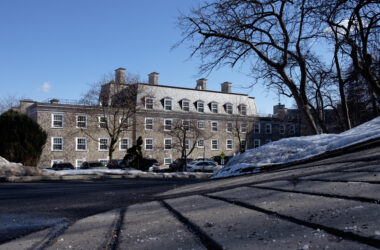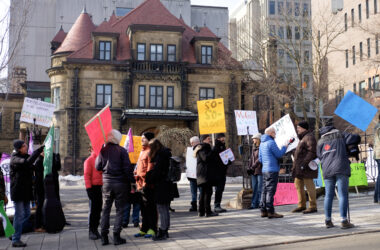 Sam Reynolds
Sam Reynolds Sam Reynolds
Sam ReynoldsMcGill was granted an injunction by Quebec courts Friday to control protesting at campus entrances.
Striking MUNACA workers are now forced to stay four metres away from the university gates. The number of protestors will also be capped within the four metre boundary.
Additionally, noise makers, such as loudspeakers or air horns, cannot be used within 25 metres of university property.
Michael Di Grappa, the university vice pesident of Administration and Finance, explained why McGill pursued an injunction in court.
“Because of activities in the past week where we felt that the safety and security of our students, faculty, and staff was at risk, where we felt that the university wasn’t able to operate properly … because of complaints that we received from students due to the noise … we felt that we had to act,” Di Grappa said.
MUNACA could not be reached for comment. The MUNACA website has issued a statement on the injunction.
“We will respect the ruling, but we will also show McGill they can’t shut up 1700 employees exercising our right to freedom of expression,” the statement read.
The statement also declared the injunction to be a positive sign.
“[I]t means that it has not been ‘business as usual’ at McGill. In fact, we’ve been so successful at expressing our dissatisfaction that McGill went to court to try to shut us up.”
While MUNACA viewed the injunction as a sign of its impact on the university, Di Grappa disagreed.
“I think what the injunction shows is that their activities were against the law,” said Di Grappa. According to him, the injunction was “absolutely not” a sign of hostility toward MUNACA. He also said it should not affect negotiations because it has not changed the terms.
SCAB REPORT RELEASED
Last week, reports surfaced that McGill had engaged in hiring scab labour and an investigator from the labour board of Quebec (Commission des normes de travail) began by pursuing information regarding to an original 57 complaints, though he uncovered many more complaints during the investigation. At the conclusion of the 12-day investigation, the CNT found the university guilty of hiring scab labourers.
The CNT investigator, Thomas Hayden, investigated over 100 cases in which MUNACA workers were replaced by non-MUNACA workers. Of these, he discovered 26 instances of scabbing in violation of Sections of article 109.1 of Quebec’s Code de Travail. Some of these incidences of scabbing were cases in which members of the Association of McGill Undergraduate Student Employees (AMUSE) had filled in for MUNACA workers on strike. AMUSE president Fariddudin Attar attributes this in part to the nature of AMUSE members’ employment.
“[Many] casual workers at McGill … don’t have job descriptions, fixed hours, [or] contracts; they can be whatever their employers want.”
Perhaps another issue is that AMUSE is currently involved in its first contract negotiations with the university. As such, the union is only beginning to standardize AMUSE working hours and job descriptions, among other things.
“We know that AMUSE workers [have been working] a lot of MUNACA hours … whether that’s legally scabbing or not could be a gray area … the division of labour between what a MUNACA worker does and what an AMUSE worker does is not quite clear.”
McGill, however, is unfazed by the investigator’s findings. From the outset, the university has maintained that it has done nothing illegal. There are instances in which McGill can replace striking workers in accordance with Quebec’s labour laws. These include managers and unsolicited volunteers, as outlined on the University’s Human Resources website.
According to Di Grappa, this report will hold little bearing on the University’s actions. The outcome of the report, which is not legally binding but rather provides the grounds for MUNACA to file a law suit. Hwever, this is not likely to change the way in which the university behaves.
“We believe that everything we’ve done is in compliance with the law,” Di Grappa said. “there are clear cases of factual error [in the report] … and in other cases, [the investigator] has a different interpretation of the law and of our rights” MUNACA, which did not return calls for comment, displayed the labour report findings prominently on its website.
DISRUPTION AT SENATE
McGill senators making their way into last Thursday’s senate meeting were greeted by the sound of MUNACA supporters chanting and drumming. A group of over 20 vocal protesters congregated outside the senate’s meeting room but were denied entry on the basis of maintaining order at the meeting.
There was much discussion regarding the labour disruption at senate. Principal and senate chair Heather Munroe-Blum expressed the administration’s desire to quickly reach a fair settlement with MUNACA, acknowledging that “McGill is proud of all of its employees.”
Senator and Professor of Communication Studies Darin Barney spoke against the administration’s ‘business as usual’ apporach during the strike, which he believed to be inaccurate. He spoke of managers who refused to even acknowledge their striking co-workers as they crossed picket lines and managers overworked to maintain seeming normalcy.
Many senators wan
ted to know how McGill foresees continuing into the strike with an increasing burden on managers who have been delegated much of the work normally done by striking workers. When Munroe-Blum declined to comment, suggesting that Senate was not the correct venue for such discussion, many senators drummed on tables as a form of respectful protest. A number of MUNACA supporters walked out.
“McGill revises its contingency plans on a daily basis,” Di Grappa said in a follow-up interview. “We will be able to keep it up.”
STUDENT-LED PROTEST
At noon on Monday, approximately 50 students sat at the Y-intersection on McGill campus in protest of the injunction levelled by the University against the MUNACA strikers. They were soon joined by students from Michelle Hartman’s first-year seminar. Hartman, an Associate Professor of Islamic Studies, was leading a discussion about the strike when a student brought up the ongoing demonstration.
“The class unanimously decided that we wanted to come out and support MUNACA,” said Brinn Davies, a U0 student in the seminar.
“This was organized independently of MUNACA,” said Joël Pedneault, SSMU VP External, of the strike.
An administrative member from the office of the Dean of Students reminded students that although McGill is technically a car-free campus, they were occupying an emergency vehicle route and had to be aware in case any cars came through. Security members were present, including one who held a video camera, but did not interact with the protestors.
The demonstration ended with a march to the James Administration building.








